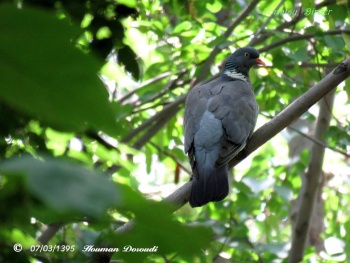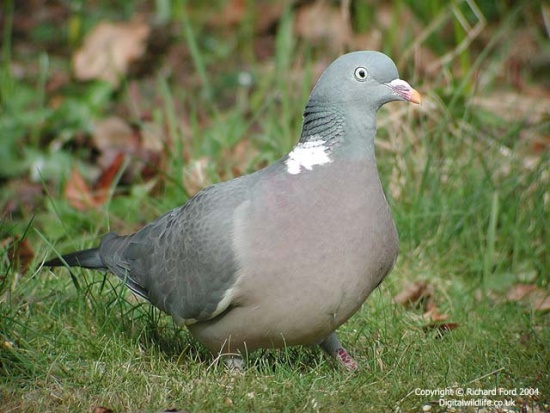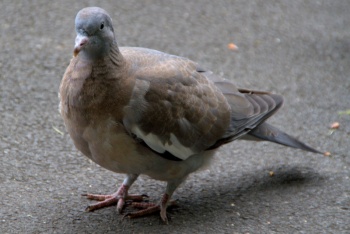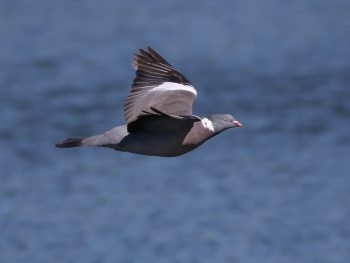m (→External Links) |
(taxon, refs, GS) |
||
| Line 18: | Line 18: | ||
====Subspecies==== | ====Subspecies==== | ||
[[Image:IMG 1149ao.JPG|thumb|350px|right|Adult in flight<br />Photo © by {{user|IanF|IanF}}<br />[[Cowpen Bewley Woodland Park]], Billingham, [[Cleveland]], [[UK]], 3020 May 2009]] | [[Image:IMG 1149ao.JPG|thumb|350px|right|Adult in flight<br />Photo © by {{user|IanF|IanF}}<br />[[Cowpen Bewley Woodland Park]], Billingham, [[Cleveland]], [[UK]], 3020 May 2009]] | ||
| − | + | Clements recognizes these subspecies[[#References|[1]]]: | |
*''C. p. azorica'':Duller with smaller neck patches. | *''C. p. azorica'':Duller with smaller neck patches. | ||
:*Eastern and central [[Azores]] | :*Eastern and central [[Azores]] | ||
| Line 44: | Line 44: | ||
==References== | ==References== | ||
| − | #{{Ref- | + | #{{Ref-Clements6thOct23}}#{{Ref-GillDonskerRasmussen22V13.2}}#[http://www.garden-birds.co.uk/birds/wood_pigeon.html British Garden Birds] |
#Baptista, L.F., Trail, P.W., Horblit, H.M., Boesman, P. & Garcia, E.F.J. (2018). Common Woodpigeon ''(Columba palumbus''). In: del Hoyo, J., Elliott, A., Sargatal, J., Christie, D.A. & de Juana, E. (eds.). Handbook of the Birds of the World Alive. Lynx Edicions, Barcelona. (retrieved from https://www.hbw.com/node/54105 on 8 October 2018). | #Baptista, L.F., Trail, P.W., Horblit, H.M., Boesman, P. & Garcia, E.F.J. (2018). Common Woodpigeon ''(Columba palumbus''). In: del Hoyo, J., Elliott, A., Sargatal, J., Christie, D.A. & de Juana, E. (eds.). Handbook of the Birds of the World Alive. Lynx Edicions, Barcelona. (retrieved from https://www.hbw.com/node/54105 on 8 October 2018). | ||
#Goodwin, D. (1983) Pigeons and Doves of the World. Cornell Univ. Press. | #Goodwin, D. (1983) Pigeons and Doves of the World. Cornell Univ. Press. | ||
| Line 51: | Line 51: | ||
==External Links== | ==External Links== | ||
| − | {{GSearch|"Columba palumbus" {{!}} "Common Wood Pigeon"}} | + | {{GSearch|"Columba palumbus" {{!}} "Common Wood Pigeon" {{!}} "Common Wood-Pigeon"}} |
{{GS-checked}}1 | {{GS-checked}}1 | ||
<br /> | <br /> | ||
Latest revision as of 00:49, 14 December 2023
Alternative names: Common Wood-Pigeon, Wood Pigeon
- Columba palumbus
Identification
40-42cm (15¾-16½ in)
- Grey body
- Pink breast
- Green, white and purple neck patch
- White wing patch
- Black tipped tail
- Bright yellow iris
- Pink legs and bill
Juvenile: browner, duller, no neck patch.
Distribution
Taxonomy
Subspecies
Clements recognizes these subspecies[1]:
- C. p. azorica:Duller with smaller neck patches.
- Eastern and central Azores
- C. p. maderensis:
- Formerly mountains of Madeira. Probably extinct
- C. p. palumbus:
- C. p. iranica:Whitish or pale yellow bill.
- Southern Transcaspia to Iran
- C. p. casiotis: Neck patch creamy buff or cinnamon, not white.
- Kazakstan to northern Afghanistan, northern Pakistan, north-western India and Nepal
Habitat
Parks, gardens, woods, and farmland.
Behaviour
Diet
The diet includes grain, crops and seeds.
Breeding

Photo © by Houman Doroudi (Tormtay)
Hircainian Jungle, National Botanical Garden of Iran, Tehran, Iran, 27 May 2016
Both sexes build the platform nest from twigs in a bush or shrub, particularly in evergreens. The 2 glossy white eggs are incubated by both sexes for 17 days; the young fledge 29-35 days later. There can be up to 3 clutches. Breeding can start as early as March and continue until November.
Vocalisation
Call: ru-hoo ru ru-hoo. Listen to Common Wood Pigeon voice clip
References
- Clements, J. F., P. C. Rasmussen, T. S. Schulenberg, M. J. Iliff, T. A. Fredericks, J. A. Gerbracht, D. Lepage, A. Spencer, S. M. Billerman, B. L. Sullivan, and C. L. Wood. 2023. The eBird/Clements checklist of Birds of the World: v2023. Downloaded from https://www.birds.cornell.edu/clementschecklist/download/
- Gill, F, D Donsker, and P Rasmussen (Eds). 2023. IOC World Bird List (v 13.2). Doi 10.14344/IOC.ML.13.2. http://www.worldbirdnames.org/
- British Garden Birds
- Baptista, L.F., Trail, P.W., Horblit, H.M., Boesman, P. & Garcia, E.F.J. (2018). Common Woodpigeon (Columba palumbus). In: del Hoyo, J., Elliott, A., Sargatal, J., Christie, D.A. & de Juana, E. (eds.). Handbook of the Birds of the World Alive. Lynx Edicions, Barcelona. (retrieved from https://www.hbw.com/node/54105 on 8 October 2018).
- Goodwin, D. (1983) Pigeons and Doves of the World. Cornell Univ. Press.
- Wikipedia contributors. (2018, September 9). Common wood pigeon. In Wikipedia, The Free Encyclopedia. Retrieved 07:37, October 8, 2018, from https://en.wikipedia.org/w/index.php?title=Common_wood_pigeon&oldid=858820530
Recommended Citation
- BirdForum Opus contributors. (2024) Common Wood Pigeon. In: BirdForum, the forum for wild birds and birding. Retrieved 7 May 2024 from https://www.birdforum.net/opus/Common_Wood_Pigeon
External Links
GSearch checked for 2020 platform.1






